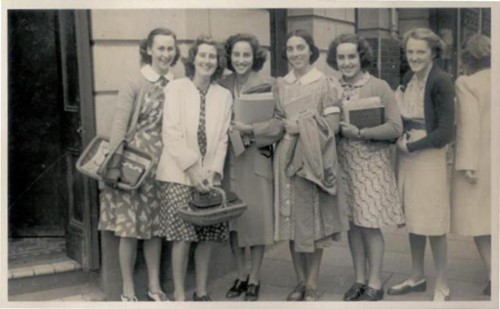Teachers and teaching -
Training
- Training
- Documents
- Artifacts
- Media
- Photographs
Training
The four initial free kindergarten associations, each of whom established and funded separate two year teaching training programmes, adopted Froebel’s call for the need for specialised education of teachers through teacher training colleges. Trainees worked in the kindergarten in the morning and attended lectures in the afternoon. In 1941 the Government provided training allowances but the bulk of the training costs remained the responsibility of the four training associations. More change came in 1947 with the development of the first national syllabus of training and in 1950 the first Diplomas of the New Zealand Free Kindergarten Union were issued. The training associations gained a substantial increase in Government assistance but at the loss of autonomy in areas such as the number of students to be enrolled. [i]
The early 1970s brought the integration of kindergarten teacher training with primary teacher colleges. The control of teacher training was transferred from the four training associations to the four state Teachers College Councils. Two new sites were established at Hamilton and Palmerston North Teachers Colleges. The new units become known as Division E – early childhood education. Provision was made for kindergarten representation on the new councils and an Advisory Committee on Early Childhood Committee was established in each college. None the less, for the free kindergarten movement, it was the end of an almost ninety year era of kindergarten training.
The post-war era also brought significant changes as to who became a teacher. Improvements in salaries, the introduction of full time positions and the expanding need for teachers to staff the rapid growth in kindergarten made kindergarten teaching a career for women from a wider social range. Māori and working class girls entered into training. Married women were considered for entry into training from 1963 and in 1973 men gained a foot in the student-training door. The first male kindergarten teacher was David Carmichael, a lecturer from Dunedin’s Kindergarten Teachers’ College. Students were granted the right to be called teacher trainees in 1978.[ii]
Kindergarten teacher training also underwent significant changes over the 1980s and 1990s. The implementation of three year training to bring kindergarten training into line with primary training was followed with the integration of kindergarten and childcare training into one early childhood education qualification.
Training
- 1910 AKA course of training (pdf 2.7MB)
- 1911 – 1947 WFKA Graduates (pdf 426KB)
- c. late 1940’s – early 1950’s Dunedin Kindergarten Students (pdf 728KB)
- 1948 NZFKU Syllabus for teacher training course (pdf 1.3MB)
- 1958 – 1969 Auckland kindergarten students (pdf 1.3MB)
- 1960 Kindergarten teaching as a career NZFKU (pdf 1.1MB)
- c. 1960’s A Guide to Students on becoming staff members (pdf 2.3MB)
- c. 1960’s Film: A Lot to Learn (pdf 35kb)
- 1962 Kindergarten Teacher Training report to NZFKU conference (pdf 1.0MB)
- 1965 WFKA course of training (pdf 632KB)
- c. 1970 AKA Training course – information (pdf 269KB)
- 1971 1st Year Student Report Results Arney Road, Auckland (jpg 328KB)
- c. 1971 Training course – information, Auckland Kindergarten Teachers’ College (pdf 1.2MB)
- 1972 Christchurch Kindergarten Training College – information brochure (pdf 797KB)
- 1973 Report on kindergarten training (pdf 590KB)
- 1973 Christchurch Kindergarten Teacher Training College Orientation – booklet (pdf 6.3MB)
- 1976 Special report on kindergarten training (pdf 581KB)
- 1976 NZFKU Future training of kindergarten teachers report 2 (pdf 278KB)
- 1980’s Working party on three year training for kindergarten teachers (pdf 231KB)
- 1980’s Proposed 3 year kindergarten teacher training (pdf 161KB)
- 4 September 1985 Teacher salaries – support for claim (pdf 93KB)
- 1989 Speakers at Wellington Free Kindergarten Graduates Association reunion (pdf 346KB)
- 1993 Presentation of Diplomas Arney Road Auckland (pdf 424KB)

Footnotes
[ii] Kerry Bethell, ‘Skirting the boundaries: The impact of marriage and domesticity on women’s perceptions of kindergarten and primary teaching as a career in postwar New Zealand’, A thesis presented in partial fulfillment of the requirements for the degree of Master of Education, Massey University, 1998.
